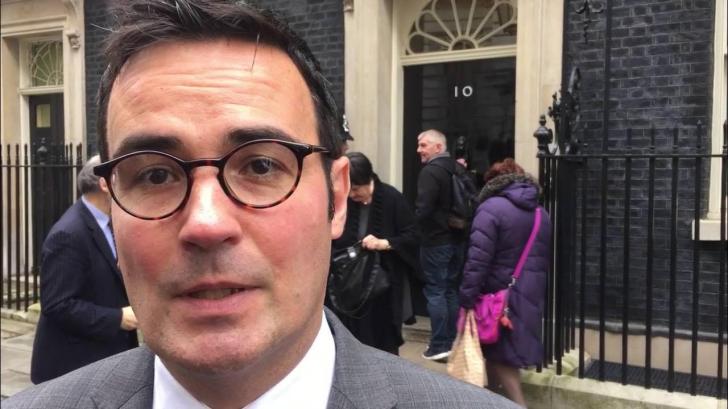News / National
British Lord lampoons Zimbabwe for congratulating Botswana's opposition
02 Nov 2024 at 08:49hrs | Views

In a scathing response, Lord Jonathan Oates, a member of the United Kingdom's House of Lords, has condemned Zimbabwean government spokesperson Ndabaningi Mangwana for congratulating Botswana's opposition party, the Umbrella for Democratic Change (UDC), following their recent electoral victory. Oates labeled Mangwana's comments as "breathtaking shamelessness," particularly in light of Zimbabwe's contentious electoral history.
Mangwana's praise for the UDC, which successfully unseated the Botswana Democratic Party (BDP) after 58 years in power, was met with Oates's sharp critique. He highlighted the violent 2008 elections in Zimbabwe, where then-President Robert Mugabe was widely acknowledged to have lost to late opposition leader Morgan Tsvangirai but refused to relinquish power, bolstered by support from the military and his successor, Emmerson Mnangagwa.
"Breathtaking shamelessness from Mangwana. If Zanu-PF had conceded defeat in 2008, an election its own President, Mugabe, later admitted he lost, Zimbabwe would have a much brighter future. Zanu-PF might even have subsequently won back power democratically," Oates stated, referencing the bloody aftermath of the elections that led to widespread violence and the deaths of many opposition supporters.
He continued, criticizing the tactics employed by Zanu-PF to maintain their grip on power: "Instead, they bludgeoned and beat their way to hanging on to power and have been fixing elections and locking up opponents ever since. Meanwhile, Mangwana and the rest of the Zanu-PF elite have enriched themselves at the expense of the poverty of everyone else."
Oates urged Mangwana to learn from Botswana's democratic process, suggesting that he should observe how true leaders respond to electoral defeat. "Perhaps Mangwana should make a trip to Botswana and learn how a free and fair election is won," he added.
The tumultuous 2008 elections in Zimbabwe resulted in a climate of fear, with government-affiliated groups instigating violence against opposition supporters in a campaign that became known as "wavhotera papi" (who did you vote for). Mugabe's refusal to concede defeat led to severe repercussions for the opposition, including intimidation and violence that marred the electoral landscape.
In stark contrast to Mangwana's comments, President Emmerson Mnangagwa has sent a congratulatory message to Botswana's president-elect, Duma Boko, reaffirming the commitment to strengthening bilateral relations between Zimbabwe and Botswana. Mnangagwa's message noted the desire for ongoing cooperation between the two nations, emphasizing mutual benefits for their peoples.
"On behalf of the Government and People of the Republic of Zimbabwe, I wish to extend my most sincere congratulations on your election as the next President Elect of Botswana," Mnangagwa stated. He expressed confidence that the excellent relations between the two countries would continue to flourish.
The recent election marks a significant milestone in Botswana's democratic journey, with Boko being declared the sixth president and the first from the UDC party. Chief Justice Terrence Rannowane officially confirmed Boko's victory, stating, "I have the honour and privilege to declare him as elected President of Botswana."
As the political dynamics in Southern Africa continue to evolve, Oates's remarks highlight the stark contrasts between Zimbabwe's and Botswana's electoral practices and the pressing need for genuine democratic governance in the region.
Mangwana's praise for the UDC, which successfully unseated the Botswana Democratic Party (BDP) after 58 years in power, was met with Oates's sharp critique. He highlighted the violent 2008 elections in Zimbabwe, where then-President Robert Mugabe was widely acknowledged to have lost to late opposition leader Morgan Tsvangirai but refused to relinquish power, bolstered by support from the military and his successor, Emmerson Mnangagwa.
"Breathtaking shamelessness from Mangwana. If Zanu-PF had conceded defeat in 2008, an election its own President, Mugabe, later admitted he lost, Zimbabwe would have a much brighter future. Zanu-PF might even have subsequently won back power democratically," Oates stated, referencing the bloody aftermath of the elections that led to widespread violence and the deaths of many opposition supporters.
He continued, criticizing the tactics employed by Zanu-PF to maintain their grip on power: "Instead, they bludgeoned and beat their way to hanging on to power and have been fixing elections and locking up opponents ever since. Meanwhile, Mangwana and the rest of the Zanu-PF elite have enriched themselves at the expense of the poverty of everyone else."
Oates urged Mangwana to learn from Botswana's democratic process, suggesting that he should observe how true leaders respond to electoral defeat. "Perhaps Mangwana should make a trip to Botswana and learn how a free and fair election is won," he added.
The tumultuous 2008 elections in Zimbabwe resulted in a climate of fear, with government-affiliated groups instigating violence against opposition supporters in a campaign that became known as "wavhotera papi" (who did you vote for). Mugabe's refusal to concede defeat led to severe repercussions for the opposition, including intimidation and violence that marred the electoral landscape.
In stark contrast to Mangwana's comments, President Emmerson Mnangagwa has sent a congratulatory message to Botswana's president-elect, Duma Boko, reaffirming the commitment to strengthening bilateral relations between Zimbabwe and Botswana. Mnangagwa's message noted the desire for ongoing cooperation between the two nations, emphasizing mutual benefits for their peoples.
"On behalf of the Government and People of the Republic of Zimbabwe, I wish to extend my most sincere congratulations on your election as the next President Elect of Botswana," Mnangagwa stated. He expressed confidence that the excellent relations between the two countries would continue to flourish.
The recent election marks a significant milestone in Botswana's democratic journey, with Boko being declared the sixth president and the first from the UDC party. Chief Justice Terrence Rannowane officially confirmed Boko's victory, stating, "I have the honour and privilege to declare him as elected President of Botswana."
As the political dynamics in Southern Africa continue to evolve, Oates's remarks highlight the stark contrasts between Zimbabwe's and Botswana's electoral practices and the pressing need for genuine democratic governance in the region.
Source - NewZimbabwe

































